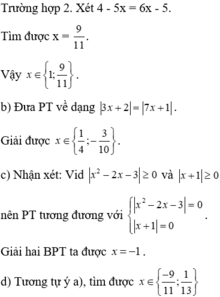giải phương trình : x^4-3x^3+5x^2-3x+1=0

Những câu hỏi liên quan
Bài 1: Giải phương trình và bất phương trình sau: 1. 5.(2-3x). (x-2) = 3.( 1-3x) 2. 4x^2 + 4x + 1= 0 3. 4x^2 - 9= 0 4. 5x^2 - 10=0 5. x^2 - 3x= -2 6. |x-5| - 3= 0
giải phương trình sau
a, (3x+2) (2x-1)=0
b, (3x-4) (2x+1) (5x-2)=0
c,x (5x-3)-5x+3=0
phương trình đâu vậy
sr nhờ cậu giải l.ại vậy nãy nhầm đề
a) 3x + 2 =0 hoặc 2x - 1 =0 tự giải tiếp
b) 3x -4 =0 ... 2x - 1 =0 ....5x - 2 =0
c) x = 0 hoặc 25 x^2 -9 =0 ( ko biết đúng ko nha)
Xem thêm câu trả lời
Giải các phương trình sau:
a) \(5x - 30 = 0\);
b) \(4 - 3x = 11\);
c) \(3x + x + 20 = 0\);
d) \(\dfrac{1}{3}x + \dfrac{1}{2} = x + 2\).
a) \(5x - 30 = 0\)
\(5x = 0 + 30\)
\(5x = 30\)
\(x = 30:5\)
\(x = 6\)
Vậy phương trình có nghiệm \(x = 6\).
b) \(4 - 3x = 11\)
\( - 3x = 11 - 4\)
\( - 3x = 7\)
\(x = \left( { 7} \right):\left( { - 3} \right)\)
\(x = \dfrac{-7}{3}\)
Vậy phương trình có nghiệm \(x = \dfrac{7}{3}\).
c) \(3x + x + 20 = 0\)
\(4x + 20 = 0\)
\(4x = 0 - 20\)
\(4x = - 20\)
\(x = \left( { - 20} \right):4\)
\(x = - 5\)
Vậy phương trình có nghiệm \(x = - 5\).
d) \(\dfrac{1}{3}x + \dfrac{1}{2} = x + 2\)
\(\dfrac{1}{3}x - x = 2 - \dfrac{1}{2}\)
\(\dfrac{{ - 2}}{3}x = \dfrac{3}{2}\)
\(x = \dfrac{3}{2}:\left( {\dfrac{{ - 2}}{3}} \right)\)
\(x = \dfrac{{ - 9}}{4}\)
Vậy phương trình có nghiệm \(x = \dfrac{{ - 9}}{4}\).
Đúng 1
Bình luận (2)
Giải các phương trình sau:
a \(x^4=5x^2+2x-3\)
b \(x^4=6x^2+12x+10\)
c \(3x^3+3x^2+3x=-1\)
d \(8x^3-12x^2+6x-5=0\)
bài 1 giải các phương trình sau:h,left(dfrac{3}{4}x-1right)left(dfrac{5}{3}x+2right)0bài 2 giải các phương trình sau:b,3x-152x(x-5) m,(1-x)(5x+3)(3x-7)(x-1)d,x(x+6)-7x-420 p,left(2x-1right)^2-40f,x^3+2x^2-left(x-2right)0 r,left(2x-1right)^249h,(3x-1)(6x+1)(x+7)(3x-1) t,left(5x-3right)^2-left(4x-7right)^20j,left(2x-5right)^2-left(x+2right)^20 u,x^2-10x+160w,x...
Đọc tiếp
bài 1 giải các phương trình sau:
h,\(\left(\dfrac{3}{4}x-1\right)\left(\dfrac{5}{3}x+2\right)=0\)
bài 2 giải các phương trình sau:
b,3x-15=2x(x-5) m,(1-x)(5x+3)=(3x-7)(x-1)
d,x(x+6)-7x-42=0 p,\(\left(2x-1\right)^2-4=0\)
f,\(x^3+2x^2-\left(x-2\right)=0\) r,\(\left(2x-1\right)^2=49\)
h,(3x-1)(6x+1)=(x+7)(3x-1) t,\(\left(5x-3\right)^2-\left(4x-7\right)^2=0\)
j,\(\left(2x-5\right)^2-\left(x+2\right)^2=0\) u,\(x^2-10x+16=0\)
w,\(x^2-x-12=0\)
Bài `1:`
`h)(3/4x-1)(5/3x+2)=0`
`=>[(3/4x-1=0),(5/3x+2=0):}=>[(x=4/3),(x=-6/5):}`
______________
Bài `2:`
`b)3x-15=2x(x-5)`
`<=>3(x-5)-2x(x-5)=0`
`<=>(x-5)(3-2x)=0<=>[(x=5),(x=3/2):}`
`d)x(x+6)-7x-42=0`
`<=>x(x+6)-7(x+6)=0`
`<=>(x+6)(x-7)=0<=>[(x=-6),(x=7):}`
`f)x^3-2x^2-(x-2)=0`
`<=>x^2(x-2)-(x-2)=0`
`<=>(x-2)(x^2-1)=0<=>[(x=2),(x^2=1<=>x=+-2):}`
`h)(3x-1)(6x+1)=(x+7)(3x-1)`
`<=>18x^2+3x-6x-1=3x^2-x+21x-7`
`<=>15x^2-23x+6=0<=>15x^2-5x-18x+6=0`
`<=>(3x-1)(5x-1)=0<=>[(x=1/3),(x=1/5):}`
`j)(2x-5)^2-(x+2)^2=0`
`<=>(2x-5-x-2)(2x-5+x+2)=0`
`<=>(x-7)(3x-3)=0<=>[(x=7),(x=1):}`
`w)x^2-x-12=0`
`<=>x^2-4x+3x-12=0`
`<=>(x-4)(x+3)=0<=>[(x=4),(x=-3):}`
Đúng 1
Bình luận (0)
`m)(1-x)(5x+3)=(3x-7)(x-1)`
`<=>(1-x)(5x+3)+(1-x)(3x-7)=0`
`<=>(1-x)(5x+3+3x-7)=0`
`<=>(1-x)(8x-4)=0<=>[(x=1),(x=1/2):}`
`p)(2x-1)^2-4=0`
`<=>(2x-1-2)(2x-1+2)=0`
`<=>(2x-3)(2x+1)=0<=>[(x=3/2),(x=-1/2):}`
`r)(2x-1)^2=49`
`<=>(2x-1-7)(2x-1+7)=0`
`<=>(2x-8)(2x+6)=0<=>[(x=4),(x=-3):}`
`t)(5x-3)^2-(4x-7)^2=0`
`<=>(5x-3-4x+7)(5x-3+4x-7)=0`
`<=>(x+4)(9x-10)=0<=>[(x=-4),(x=10/9):}`
`u)x^2-10x+16=0`
`<=>x^2-8x-2x+16=0`
`<=>(x-2)(x-8)=0<=>[(x=2),(x=8):}`
Đúng 1
Bình luận (0)
giải phương trình sau:
a) \(4x^2+\left(8x-4\right).\sqrt{x}-1=3x+2\sqrt{2x^2+5x-3}\)
b) \(8x^3-36x^2+\left(1-3x\right)\sqrt{3x-2}-3\sqrt{3x-2}+63x-32=0\)
c) \(2\sqrt[3]{3x-2}-3\sqrt{6-5x}+16=0\)
d) \(\sqrt[3]{x+6}-2\sqrt{x-1}=4-x^2\)
Giải các phương trình sau:a)
4
−
5
x
5
−
6
x
;
b)
3
x
+
2
−
7
x
+
1
0
;
c)...
Đọc tiếp
Giải các phương trình sau:
a) 4 − 5 x = 5 − 6 x ; b) 3 x + 2 − 7 x + 1 = 0 ;
c) x 2 − 2 x − 3 + x + 1 = 0 ; d) 1 4 x − 5 = 3 x + 1
a) Trường hợp 1. Xét 4 - 5x = 5 - 6x.
Tìm được x = 1.

Đúng 0
Bình luận (0)
Giải các phương trình sau:
a \(x^2+3x+4=0\)
b \(3x^3-x+2=0\)
c \(x^4-4x^3-9x^2+8x+4=0\)
d \(x^4+4x^3+6x^2-5x-8=0\)
a: Ta có: \(x^2+3x+4=0\)
\(\text{Δ}=3^2-4\cdot1\cdot4=9-16=-7< 0\)
Do đó: Phương trình vô nghiệm
Đúng 1
Bình luận (0)
Giải các phương trình
1,\(3x-1=0\\\) 4, \(\dfrac{x}{3}-\dfrac{x}{5}=4\)
2, \(2-x=3x+1\) 5, \(\dfrac{x-1}{4}+\dfrac{2x+1}{6}=\dfrac{3}{2}\)
3, \(2\left(x-2\right)-1=5x\)
1,\(3x-1=0\Leftrightarrow3x=-1\Leftrightarrow x=-\dfrac{1}{3}\)
2,\(2-x=3x+1\Leftrightarrow2-1=3x+x\rightarrow1=4x\Rightarrow x=-\dfrac{1}{4}\)
Đúng 1
Bình luận (0)
3,\(2\left(x-2\right)-1=5x\Leftrightarrow2x-4-1=5x\Leftrightarrow2x-5x=4+1\Rightarrow3x=5\Rightarrow x=\dfrac{5}{3}\)
4,\(\dfrac{x}{3}-\dfrac{x}{5}=4\Leftrightarrow\dfrac{5x}{15}-\dfrac{3x}{15}=\dfrac{60}{15}\Rightarrow5x-3x=60\Rightarrow2x=60\Rightarrow x=\dfrac{60}{2}=30\)
Đúng 1
Bình luận (0)
5,\(\dfrac{x-1}{4}+\dfrac{2x+1}{6}=\dfrac{3}{2}\Leftrightarrow\dfrac{3\left(x-1\right)}{12}+\dfrac{2\left(2x+1\right)}{12}=\dfrac{18}{12}\)
\(3\left(x-1\right)+2\left(2x+1\right)=18\Leftrightarrow3x-3+4x+2=18\Leftrightarrow3x+4x=3-2+18\Rightarrow7x=19\Rightarrow x=\dfrac{19}{2}\)
Đúng 1
Bình luận (0)




















